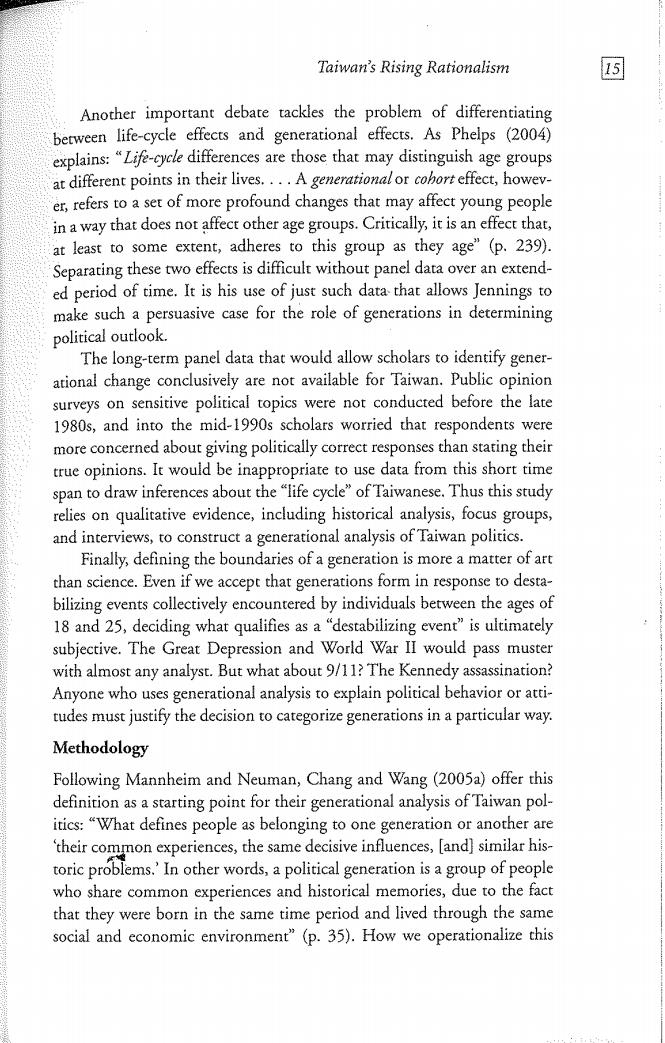
Taiwan's Rising Rationalism Another important debate tackles the problem of differentiating between life-cycle effects and generational effects.As Phelps (2004) explains:"Lifycle differences are those that may distinguish age groups at different points in their lives....A generationalor cohort effect,howev- er,refers to a set of more profound changes that may affect young people in a way that does not affect other age groups.Critically,it is an effect that, at least to some extent,adheres to this group as they age"(p.239). Separating these two effects is difficult without panel data over an extend- ed period of time.It is his use of just such data that allows Jennings to make such a persuasive case for the role of generations in determining political outlook. The long-term panel data that would allow scholars to identify gener- ational change conclusively are not available for Taiwan.Public opinion surveys on sensitive political topics were not conducted before the late 1980s,and into the mid-1990s scholars worried that respondents were more concerned about giving politically correct responses than stating their true opinions.It would be inappropriate to use data from this short time span to draw inferences about the"life cycle"of Taiwanese.Thus this study relies on qualitative evidence,including historical analysis,focus groups, and interviews,to construct a generational analysis of Taiwan politics. Finally,defining the boundaries of a generation is more a matter of art than science.Even if we accept that generations form in response to desta- bilizing events collectively encountered by individuals between the ages of 18 and 25,deciding what qualifies as a"destabilizing event"is ultimately subjective.The Great Depression and World War II would pass muster with almost any analyst.But what about 9/11?The Kennedy assassination? Anyone who uses generational analysis to explain political behavior or atti- tudes must justify the decision to categorize generations in a particular way. Methodology Following Mannheim and Neuman,Chang and Wang(2005a)offer this definition as a starting point for their generational analysis of Taiwan pol- itics:"What defines people as belonging to one generation or another are their common experiences,the same decisive influences,[and]similar his- toric problems.'In other words,a political generation is a group of people who share common experiences and historical memories,due to the fact that they were born in the same time period and lived through the same social and economic environment"(p.35).How we operationalize this
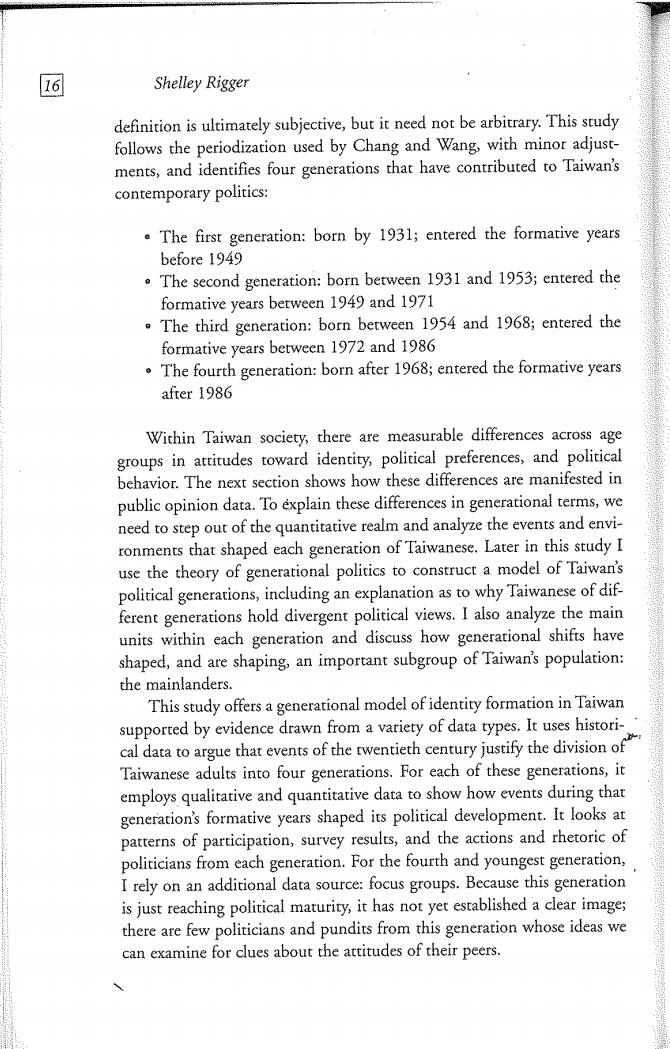
6 Shelley Rigger definition is ultimately subjective,but it need not be arbitrary.This study follows the periodization used by Chang and Wang,with minor adjust- ments,and identifies four generations that have contributed to Taiwan's contemporary politics: The first generation:born by 1931;entered the formative years before 1949 The second generation:born between 1931 and 1953;entered the formative years between 1949 and 1971 The third generation:born between 1954 and 1968;entered the formative years between 1972 and 1986 .The fourth generation:born after 1968;entered the formative years after 1986 Within Taiwan society,there are measurable differences across age groups in attitudes toward identity,political preferences,and political behavior.The next section shows how these differences are manifested in public opinion data.To explain these differences in generational terms,we need to step out of the quantitative realm and analyze the events and envi- ronments that shaped each generation of Taiwanese.Later in this study I use the theory of generational politics to construct a model of Taiwan's political generations,including an explanation as to why Taiwanese of dif- ferent generations hold divergent political views.I also analyze the main units within each generation and discuss how generational shifts have shaped,and are shaping,an important subgroup of Taiwan's population: the mainlanders. This study offers a generational model of identity formation in Taiwan supported by evidence drawn from a variety of data types.It uses histori- cal data toargue that evens of the twentieth ury justify thedivsof Taiwanese adults into four generations.For each of these generations,it employs qualitative and quantitative data to show how events during that generation's formative years shaped its political development.It looks at patterns of participation,survey results,and the actions and rhetoric of politicians from each generation.For the fourth and youngest generation, I rely on an additional data source:focus groups.Because this generation is just reaching political maturity,it has not yet established a clear image; there are few politicians and pundits from this generation whose ideas we can examine for clues about the attitudes of their peers
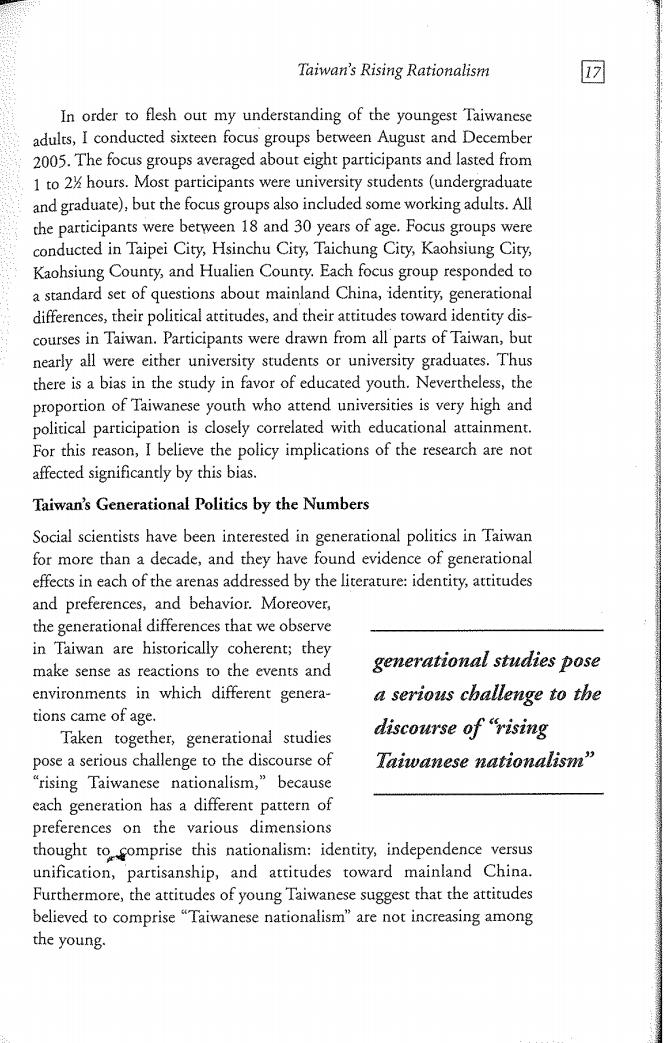
Taiwan's Rising Rationalism ☑ In order to flesh out my understanding of the youngest Taiwanese adults,I conducted sixteen focus groups between August and December 2005.The focus groups averaged about eight participants and lasted from 1 to 2%hours.Most participants were university students(undergraduate and graduate),but the focus groups also included some working adults.All the participants were between 18 and 30 years of age.Focus groups were conducted in Taipei City,Hsinchu City,Taichung City,Kaohsiung City, Kaohsiung County,and Hualien County.Each focus group responded to a standard set of questions about mainland China,identity,generational differences,their political attitudes,and their attitudes toward identity dis- courses in Taiwan.Participants were drawn from all parts of Taiwan,but nearly all were either university students or university graduates.Thus there is a bias in the study in favor of educated youth.Nevertheless,the proportion of Taiwanese youth who attend universities is very high and political participation is closely correlated with educational attainment. For this reason,I believe the policy implications of the research are not affected significantly by this bias. Taiwan's Generational Politics by the Numbers Social scientists have been interested in generational politics in Taiwan for more than a decade,and they have found evidence of generational effects in each of the arenas addressed by the literature:identity,attitudes and preferences,and behavior.Moreover, the generational differences that we observe in Taiwan are historically coherent;they make sense as reactions to the events and generational studies pose environments in which different genera- a serious challenge to the tions came of age. Taken together,generational studies discourse of rising pose a serious challenge to the discourse of Taiwanese nationalism" “rising Taiwanese nationalism,”because each generation has a different pattern of preferences on the various dimensions thought to comprise this nationalism:identity,independence versus unification,partisanship,and attitudes toward mainland China. Furthermore,the attitudes of young Taiwanese suggest that the attitudes believed to comprise "Taiwanese nationalism"are not increasing among the young
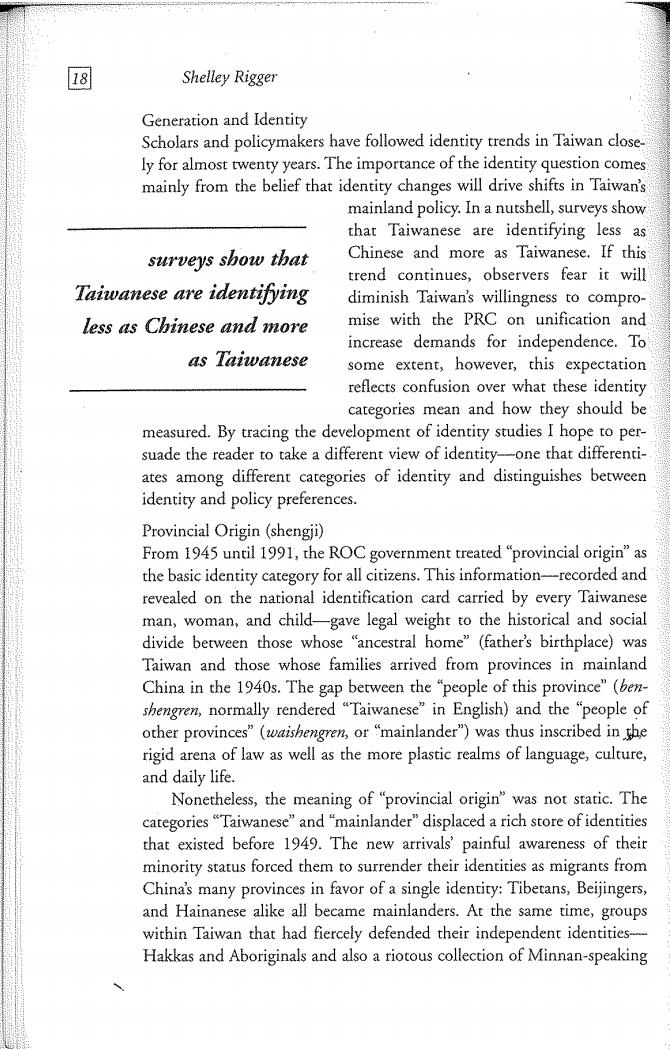
⑧ Shelley Rigger Generation and Identity Scholars and policymakers have followed identity trends in Taiwan close- ly for almost twenty years.The importance of the identity question comes mainly from the belief that identity changes will drive shifts in Taiwan's mainland policy.In a nutshell,surveys show that Taiwanese are identifying less as surveys show that Chinese and more as Taiwanese.If this trend continues,observers fear it will Taiwanese are identifying diminish Taiwan's willingness to compro- less as Chinese and more mise with the PRC on unification and increase demands for independence.To as Taiwanese some extent,however,this expectation reflects confusion over what these identity categories mean and how they should be measured.By tracing the development of identity studies I hope to per- suade the reader to take a different view of identity-one that differenti- ates among different categories of identity and distinguishes between identity and policy preferences. Provincial Origin(shengji) From 1945 until 1991,the ROC government treated"provincial origin"as the basic identity category for all citizens.This information-recorded and revealed on the national identification card carried by every Taiwanese man,woman,and child-gave legal weight to the historical and social divide between those whose "ancestral home"(father's birthplace)was Taiwan and those whose families arrived from provinces in mainland China in the 1940s.The gap between the "people of this province"(ben- shengren,normally rendered "Taiwanese"in English)and the "people of other provinces"(wishengren,or"mainlander")was thus inscribed in he rigid arena of law as well as the more plastic realms of language,culture, and daily life. Nonetheless,the meaning of"provincial origin"was not static.The categories“Taiwanese”and“mainlander'”displaced a rich store ofidentities that existed before 1949.The new arrivals'painful awareness of their minority status forced them to surrender their identities as migrants from China's many provinces in favor of a single identity:Tibetans,Beijingers, and Hainanese alike all became mainlanders.At the same time,groups within Taiwan that had fiercely defended their independent identities- Hakkas and Aboriginals and also a riotous collection of Minnan-speaking
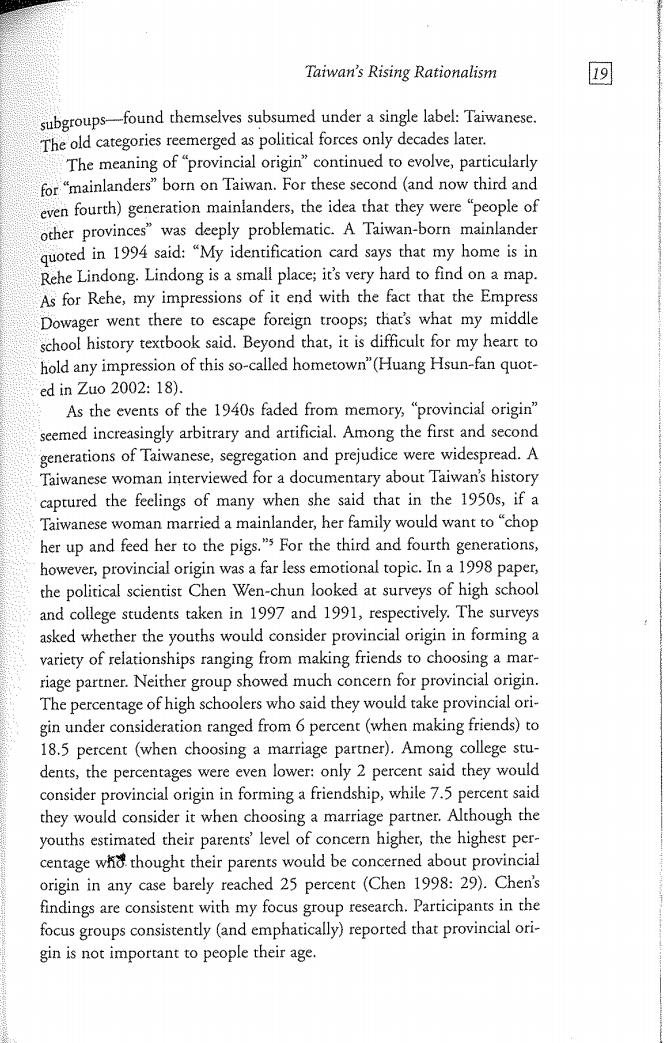
Taiwan's Rising Rationalism 9 subgroups-found themselves subsumed under a single label:Taiwanese. Theold categories reemerged as political forces only decades later. The meaning of "provincial origin"continued to evolve,particularly for"mainlanders"born on Taiwan.For these second (and now third and even fourth)generation mainlanders,the idea that they were people of other provinces"was deeply problematic.A Taiwan-born mainlander quoted in 1994 said:"My identification card says that my home is in Rehe Lindong.Lindong is a small place;it's very hard to find on a map. As for Rehe,my impressions of it end with the fact that the Empress Dowager went there to escape foreign troops;that's what my middle school history textbook said.Beyond that,it is difficult for my heart to hold any impression of this so-called hometown(Huang Hsun-fan quot- ed in Zuo 2002:18). As the events of the 1940s faded from memory,"provincial origin" seemed increasingly arbitrary and artificial.Among the first and second generations of Taiwanese,segregation and prejudice were widespread.A Taiwanese woman interviewed for a documentary about Taiwan's history captured the feelings of many when she said that in the 1950s,if a Taiwanese woman married a mainlander,her family would want to"chop her up and feed her to the pigs."For the third and fourth generations, however,provincial origin was a far less emotional topic.In a 1998 paper, the political scientist Chen Wen-chun looked at surveys of high school and college students taken in 1997 and 1991,respectively.The surveys asked whether the youths would consider provincial origin in forming a variety of relationships ranging from making friends to choosing a mar- riage partner.Neither group showed much concern for provincial origin. The percentage of high schoolers who said they would take provincial ori- gin under consideration ranged from 6 percent(when making friends)to 18.5 percent (when choosing a marriage partner).Among college stu- dents,the percentages were even lower:only 2 percent said they would consider provincial origin in forming a friendship,while 7.5 percent said they would consider it when choosing a marriage partner.Although the youths estimated their parents'level of concern higher,the highest per- centage who thought their parents would be concerned about provincial origin in any case barely reached 25 percent (Chen 1998:29).Chen's findings are consistent with my focus group research.Participants in the focus groups consistently(and emphatically)reported that provincial ori- gin is not important to people their age